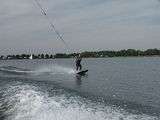Tallington
| Tallington | |
 St Lawrence' Church in December 2005 |
|
 Tallington |
|
| Population | 497 (2011 Census) |
|---|---|
| OS grid reference | TF094081 |
| – London | 80 mi (130 km) S |
| Civil parish | Tallington |
| District | South Kesteven |
| Shire county | Lincolnshire |
| Region | East Midlands |
| Country | England |
| Sovereign state | United Kingdom |
| Post town | STAMFORD |
| Postcode district | PE9 |
| Dialling code | 01780 |
| Police | Lincolnshire |
| Fire | Lincolnshire |
| Ambulance | East Midlands |
| EU Parliament | East Midlands |
| UK Parliament | Grantham and Stamford |
|
|
Coordinates: 52°39′36″N 0°22′59″W / 52.66°N 0.38315°W
Tallington is a village and civil parish in the South Kesteven district of Lincolnshire, England. The population of the civil parish at the 2011 census was 497.[1] It is situated 4 miles (6 km) east from Stamford and 8 miles (13 km) north-east from the centre of Peterborough. The village has around 200 houses.
Geography

Tallington is located on the main A1175 road (formerly the A16) (for Market Deeping) which runs between Stamford and Spalding. To the west is Uffington. Tallington has a busy level crossing over the East Coast Main Line. There was once a Tallington railway station, but it is now closed. Since the 1930s there has been a plan for a Tallington bypass and bridge over the railway ; even though the village ended up making concrete bridges for many UK motorways (including much of the Yorkshire section of the M62), there has never been a bridge made for the village. Dow Mac even offered to donate a bridge to the village.
From the East Coast Main Line south-east of the village, the parish boundary follows the River Welland to the west, it meets Uffington and crosses the A16 a half-mile west of the village at the point where the pylons cross the road, then skirts the edge of Casewick Park. It crosses the ECML a half-mile north of the village, and meets Barholm and Stowe. It skirts the northern edge of Barholm Lodge, across the north section of Tallington Lakes and meets West Deeping at King Street. It follows King Street southwards to the A16, which it follows to the west, around the western edge of West Deeping, to the River Welland, north of Lolham Mill, where it meets the City of Peterborough and the parish of Bainton.
Governance
Tallington is currently served by a Parish Council and two District Councillors and a County Councillor. The two currently elected District Councillors are Kelham Cooke (Con) and Rosemary Woolley (Con).
Community
At the Tallington Lakes Leisure Park, made from gravel pits, is a dry ski slope and water activities with a campsite. The parish church is dedicated to St Lawrence and is in the Uffington Group of churches. The village public house is the Whistle Stop next to the railway, formerly known as the Kesteven Arms. The village station closed in 1959. The River Welland passes across the south of the village. The Lincolnshire county boundary is 100 yards (91 m) to the south.
Dow-Mac

Tallington Lakes are situated directly east of the former Dow-Mac concrete works, and are formed from its gravel pits. Dow-Mac, on Barholm Road, was formed by Harry Dowsett, who lived in Greatford Hall, in 1943 as Dowsett Engineering Construction, later working with Mackay. It made concrete railway sleepers during the war, and later motorway concrete pillars and beams. Prestressed concrete was first made by Dow Mac (Products) Ltd in Tallington.
The site is now known as Tarmac Precast Concrete.
References
- ↑ "Civil Parish population 2011". Neighbourhood Statistics. Office for National Statistics. Retrieved 1 June 2016.
External links
-
 Media related to Tallington at Wikimedia Commons
Media related to Tallington at Wikimedia Commons - Tallington Lakes
- Information about the village
- Uffington Group
- Parish council
- Tallington Bypass/Level Crossing Enhancement
- Tarmac Building Products